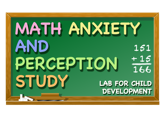Our Team

To learn more about Dr. Feigenson, visit http://pbs.jhu.edu/research/feigenson/
To learn more about the Johns Hopkins University Laboratory for Child Development, visit www.psy.jhu.edu/~labforchilddevelopment/
To learn more about the Department of Psychological and Brain Sciences at Johns Hopkins University, visit www.pbs.jhu.edu

Our Motivation
Math ability, from calculating personal debt to computing a simple restaurant tip, is critical to daily life in modern cultures. Previous research finds that mathematical competence is linked to career success, income, and psychological well-being. Yet despite the increasing need for proficiency in science and mathematics, US students have been consistently outperformed on math tests by many peer nations. Further, the struggle with mathematics begins early, with individual differences in math ability appearing in the first years of elementary school or before. In addition, recent research reveals the presence of math anxiety in children as young as 5- to 6-years old, with math anxiety correlating with more negative attitudes towards and poorer achievement in mathematics.
One strategy for remediating individual differences in math ability early in childhood, and for buffering against math anxiety, is to provide children with mathematical experiences outside of the classroom, in a context designed to be enjoyable, team-oriented, and not directly tied to classroom instruction. However, the effects of such extra-curricular math exposure on young children’s attitudes towards and achievement in mathematics remain unknown. The aim of the Math Anxiety and Perception Study is to evaluate Crazy 8s, an extracurricular, team-based math club for elementary school children. Characterizing how such experiences outside the classroom impact young learners is a critical step towards increasing math fluency and enjoyment, and may play an important role for designing effective remediation for children struggling with mathematics.

Relevant Publications from Our Lab
Libertus, M., Odic, D., Halberda, J. (in press). Intuitive sense of number correlates with math scores on college-entrance examination. Acta Psychologica.
The Johns Hopkins University Laboratory for Child Development, directed by Drs. Lisa Feigenson and Justin Halberda, has many years of experience studying foundational numerical cognition and its relationship to math achievement in children and adults. The team has studied math abilities in developmentally impaired and dyscalculic populations, in typically developing children, and in gifted children, with over two dozen publications on this topic in journals such as Nature, Proceedings of the National Academy of Sciences, and Child Development.
Relevant Publications from Other Labs




